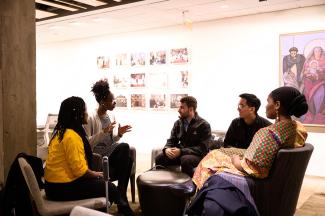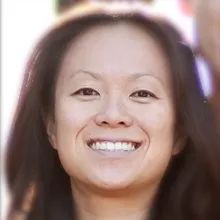What I’ve Gained through Cross-Cultural Friendships

“My roommate is actually from Thailand,” I casually mentioned to my friend Tim.
“Wait, what’s your roommate’s name?” Tim asked.
“Jennifer Chung.”
“No way, that’s my cousin!”
Among thousands of incoming students, what are the odds that I’d end up with my friend’s cousin as my roommate? And what are the odds I’d end up living with an international student? Throughout college, God placed Jen — and many others with different ethnic, racial, and nationality backgrounds — in my life. Looking back, it seemed that God had handpicked my friends to expand my horizon through the people in my life.
Before college, my schools ranged from under 0.01 to 5 percent Asian. Although I had a handful of Asian American friends, I felt the need to fit into the greater campus culture. At home, I spoke Cantonese with my family. At school, I tried to speak “American” — an attempt to present myself as a “White American” and hide the parts of myself that resembled my family. I remember breathing a sigh of relief when my friends told me, “You’re just like us.”
Being surrounded by the 20-plus percent of Asians in college was eye-opening and healing. In some ways, it was tempting to spend most of my time in the safety of my newfound Asian American community. Yet God was prodding me to invest in relationships with different cultural groups.
The Gifts of Diversity
You may have heard the story of the blind men and the elephant. Each touched a different part of the elephant. One said the elephant is like a pillar. Another said it’s like a large fan. Another said it’s like a long tube. With our individual experiences, we’re like these blind folks, each seeing God and the world through our limited perspectives and life experiences. But when we build cross-cultural relationships and live life with a diversity of people, we see other angles and pieces of the puzzle; we experience the fullness of life as God intended.
My friend Aminah grew up in an all-Black church and attended an all-Black church near campus. Because of our friendship, I went to church with her. Being the only non-Black person in her churches not only helped me understand her experience on campus a bit more since there were few Black students, but it also helped me process my own experiences.
The Trajectory of Growth
My community in InterVarsity not only provided space for healthy cross-cultural relationships but also placed these relationships in the context of Scripture, where we live in hope for the day when “every nation, tribe, people, and language” will stand before the throne of God (Rev 7:9). It’s the “already and not yet” of God’s kingdom come.
It’s not that I mastered — or will ever master — cross-cultural relationships. Having diverse friendships simply raised my awareness of cultural distinctives. It gave me the eyes to notice differences and similarities, to see beauty and complexity in culture and cross-cultural relationships. It helped me see that there are different ways of seeing and doing things. My mom used to tell me, “The more you know, the more you’re aware of how much you don’t know.” The more people of different backgrounds I encountered, the more I became aware of my ignorance of cultural differences.
Years ago, some friends and I were at an Indian restaurant. I made an insensitive and foolish comment about eating only with our hands, and my Indian friend reprimanded me, “Why would I want to use utensils that countless people have used?” I’d never thought about (nor will I ever think about) utensils that way!
Experiences like this are not only eye-opening, convicting, and humbling, but they’re also reassuring. My inappropriate comment didn’t destroy my friendship. I’ve learned that most people are forgiving, especially when they know we’re teachable and when mistakes are made in the security of relationships. I’ve learned to embrace my mistakes, to see them as a gift I can learn from. I’ve come to anticipate mistakes and learning opportunities. I’ve become more comfortable with awkwardness.
My experiences in college put me on a learning trajectory to continue being curious, ask questions, and engage in discussions around race and ethnicity.
God led me on a beautiful journey that began in my childhood and accelerated in college. Even though I’m no longer in a campus context, I’m still learning and growing in my appreciation for different cultures. Today, that means learning from and about Afghan refugees and wrestling with cultural differences in my marriage, church, and neighborhood.
Cultivating cross-cultural relationships is a lifelong process that changes as we transition to new life stages, like entering college or the work force. So be okay with mistakes. Give yourself grace. Be patient with yourself. Speak kindly to yourself when you do mess up. Despite any mistakes I’ve made, I’m grateful for the relationships and experiences God has gifted me, including the friends mentioned, all of whom remain my friends today. They’ve helped me embrace the fullness of God’s creation, and I pray that you experience the same!
Reflection Questions:
- Ponder your own race, ethnicity, and cultural heritage. What are your thoughts, questions, and feelings around each?
- Notice the demographics of your friendships. What racial, cultural, and nationality backgrounds are represented? What percentage of your friends share your ethnic background? If your friendships are generally homogeneous, pray for and be intentional in getting out of your comfort zone.
- Reflect on your friendships with people who are different from you. Are there “token voices,” where you rely on one person from a specific group or nationality to represent the whole? How can you avoid this dynamic?
Resources to Consider:
- Click here for more on engaging in helpful conversations with a global perspective.
- To learn more about your own family history, check out this activity and reflection guide.







